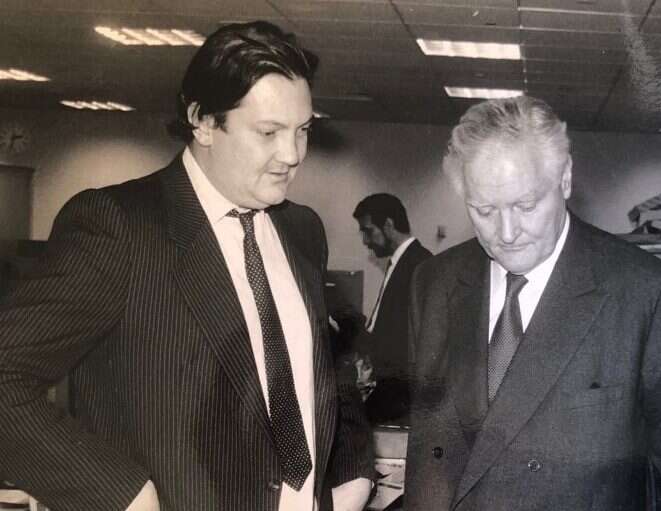
Tributes have been paid to “utterly charming” former Evening Standard and Daily Express sub-editor Nigel Griffiths, who has died aged 68.
Griffiths is believed to have been the youngest production editor on Fleet Street when he was given the role at the Standard, aged 26, just two years after joining the paper in 1976 (when it still ran six editions).
Born in Buckinghamshire in 1952, Griffiths (pictured top, left) began his journalism career at the local Bucks Advertiser, before joining the Luton News, Western Daily Press and then the Standard.
He worked on the back bench at the London daily until his early “retirement” in 2004 seeking new pastures, but returned to journalism a few years later with a role at Express Newspapers.
Griffiths had a talent for headline writing – “he was really a genius at it and loved it”, said partner Sue Reid, a journalist at the Daily Mail who met Griffiths when they both worked at the Standard.
He was behind the “Crisis? What crisis?” headline that helped bring down Jim Callaghan’s Labour government in 1979. The Sun later also used the same headline and took much of the credit.

Nigel Griffiths in the newsroom at the Evening Standard
Andrew Bordiss, who worked with Griffiths at the Standard, said: “Nigel had a headline for every occasion. He wrote ‘Terror War on America’ within seconds of seeing the 9/11 attack on the Twin Towers.”
As the deputy production editor on duty at the Sunday Express when Prince Harry and Meghan Markle wed in 2018, Griffiths wrote every headline in the paper’s royal wedding special.
A year earlier he had laid claim to writing the longest word to ever to appear in a newspaper headline: pneumoultramicroscopicossilicovulcanoconiosis.
Griffiths worked at the Express until he fell ill, having been diagnosed with cancer, but had expected to return. He had been due to marry Reid after she proposed to him, but the coronavirus pandemic scuppered their plans.
He died peacefully at home with family on Friday morning following a short illness and leaves behind daughter Charlotte and stepson Harry, both journalists. Charlotte said her father inspired her career choice.
Reid said Griffiths was an “incredibly intelligent” man who had been “respected and well liked” by his peers. The Express needed three cards for all the signatures from well-wishers when he fell ill.
Daily Express editor Gary Jones described Griffiths as “a delightful gentleman, a tremendous journalist, and such a warm and empathetic character”.
He added: “It was a privilege to work alongside him. Never have I met someone so utterly charming as Nigel.
“He was a true professional, and when we chatted when he last came into the office he was, as ever, so passionate about the job and his desire to be amongst his friends and comrades once more. We shall all miss him greatly.”

Nigel Griffiths
Doug Wills, managing editor of the Evening Standard, said Griffiths was a “stalwart of the backbench for more than 20 years”.
“As assistant editor he was renowned for his love of fast-pace multi-editions and his ability to instantly write the best splash headlines that the nationals would follow the next day.
“Nigel was hugely respected and much liked by editors, editorial executives and journalists during his 27 years with the Standard in Fleet Street and then with its move to Kensington.
“He will be fondly remembered by all as a brilliant production journalist who thrived on the pressure of deadlines.”
Close family will attend his funeral. A memorial will be held at St Bride’s Church on Fleet Street at a future date yet to be decided.
Email pged@pressgazette.co.uk to point out mistakes, provide story tips or send in a letter for publication on our "Letters Page" blog
